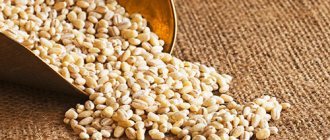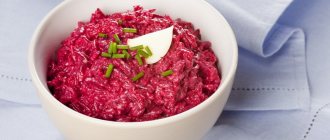After the birth of a child, a nursing mother is forced to limit her diet. After all, the food she eats goes along with the milk to the baby. New foods cause allergies, colic and other digestive disorders in newborns. It is important to choose the menu so as not to harm the baby. Let's figure out whether a nursing mother can eat chicory.
Chicory: nutritional properties
With the onset of pregnancy, women have to partially or completely give up coffee. Many expectant mothers have a hard time giving up an invigorating morning drink. After giving birth, life without coffee seems even more difficult. Sleepless nights, loss of energy and vitamin deficiency force you to look for ways to cheer yourself up. To get a stimulating effect comparable to coffee, you can drink chicory.
The chicory drink contains vitamins, acids, polysaccharides, mineral salts, microelements, tannins, proteins and other useful components. The coffee substitute that the mother drinks will also be useful for the baby. The components are absorbed into the blood and partially penetrate into breast milk.
Unlike coffee, chicory does not contain caffeine. It does not excite the nervous system and does not provoke insomnia.
Benefits of the drink for women:
- causes a surge of strength, increases performance;
- strengthens the immune system, helps in the fight against infectious diseases;
- stabilizes the functioning of the nervous system, increases stress resistance and calms;
- improves the functioning of the gastrointestinal tract, stimulates intestinal motility;
- reduces sugar levels;
- has a choleretic and diuretic effect, eliminates swelling and improves the condition of the liver;
- launches metabolic processes and accelerates weight loss;
- has a mild anti-inflammatory and detoxifying effect;
- strengthens blood vessels and stabilizes heart function;
- improves skin condition, strengthens nails and hair.
The herbal remedy is a good prevention of vitamin deficiency, cardiovascular diseases, diabetes, liver and gallbladder pathologies. But women during breastfeeding need to pay attention not only to positive qualities. Any product that a mother uses must be safe for her child.
Chicory instead of coffee
Coffee is on the list of drinks that are undesirable to drink while breastfeeding. However, many women love coffee and do not want to give it up. After all, it tones and invigorates, increases tone and increases energy levels. However, caffeine in the drink will negatively affect the baby’s nerve cells.
In the first three to four months, the newborn’s body is just getting used to new conditions, and therefore reacts negatively to many foods.
Coffee can cause allergies or eating disorders in your baby. In addition, it will have a stimulating effect on the baby's nervous system. The child will sleep poorly, be nervous and cry.
Many who cannot drink coffee replace the drink with chicory. The drink made from chicory root does not contain caffeine, which will protect the baby’s body. Chicory represents small blue flowers that grow around us in fields and meadows.
Chicory is considered a weed, but its root has beneficial effects on human health and well-being.
Beneficial features
- Does not contain caffeine and helps eliminate coffee from your diet;
- B vitamins have a beneficial effect on nerve cells, elevate mood and give energy;
- Inulin in the plant lowers blood sugar levels and neutralizes the harm of sweets. Useful for diabetics;
- Cleanses the body, especially the liver and kidneys, removes toxins and other harmful substances;
- Magnesium and calcium, nicotinic acid PP, vitamins A and E tone the skin and improve hair condition;
- Prevents dysbiosis and constipation, stabilizes intestinal function;
- Vitamin C improves immunity and restores strength, helps prevent diseases and fight infections;
- Helps the body absorb vitamins and minerals;
- Potassium and magnesium prevent and help with heart disease;
- Dilates blood vessels;
- Iron helps prevent and treat anemia.
Is it possible to eat chicory while breastfeeding?
Chicory is not contraindicated during breastfeeding. If coffee drinks indicate that they are not recommended during lactation, then chicory manufacturers do not mention this. You can drink chicory while breastfeeding, but the mother needs to monitor the baby’s reaction to this product.
Regardless of whether a woman drank a coffee substitute before giving birth, after birth this product should be introduced gradually. Different sources allow you to drink from 1-2 cups of herbal drink per week to 3-4 cups per day.
It is difficult to determine the exact amount, since the needs of a woman’s body, her state of health and the baby’s reactions to new products are always different.
While breastfeeding, you can drink a coffee substitute. After the first drink, the woman will understand whether the child has a negative reaction to the herbal remedy. During the introduction of chicory into the diet and in the future, a nursing mother must take precautions.
What are the benefits of chicory?
Chicory root contains B vitamins (B1, B2, B3), necessary for the normal functioning of the nervous system, microelements (potassium, sodium, magnesium, calcium, iron, phosphorus), as well as vitamin A, good for the eyes, vitamin C, organic acids, tannins and protein.
Let's take a closer look at the positive effects of chicory on the human body.
Digestion. Chicory is best known around the world as a digestive aid due to the high inulin (dietary fiber) content of the roots. A study published in the Journal of Nutrition in 1998 (Catholic University of Leuven, Belgium) identified inulin as a potent growth factor for bifidobacteria in the human intestine. Thanks to this substance, the plant helps fight constipation, heartburn, and reduces acidity. In addition, inulin improves the absorption of calcium in the body and serves as an excellent sugar substitute for people with diabetes.- Heart. Reduces cholesterol levels (the main cause of atherosclerosis and arterial hypertension), helps prevent arrhythmia, tachycardia (increased heart rate) and the formation of blood clots.
- Joints. It is actively used in the treatment of joint inflammation, as it can significantly reduce inflammation. A 2010 study found that 70% of subjects with osteoarthritis who took chicory reported significant pain relief.
- Immunity. Pronounced antibacterial effect against a number of dangerous pathogens. A study published in 2002 suggests a supposed anti-cancer effect of chicory in the rectal area. But the full protective properties of the plant have not yet been studied.
- Nervous system. Acts as a sedative and hypnotic. Relieving anxiety and stress will help fight insomnia, prevent premature aging, hormonal imbalances, and heart disease.
- Kidneys. The mild diuretic property will help rid the body of toxins accumulated, including in the liver and kidneys.
First of all, it is a medicinal plant, although it is sold in any store. Therefore, whether it is possible to drink chicory while breastfeeding in your particular case should be decided by your personal doctor and your baby’s pediatrician.
Precautionary measures
Doctors, nutritionists, breastfeeding consultants and experienced breastfeeding women have different views on chicory during breastfeeding. Some believe that you should give up herbal drinks for the entire period. Others talk about the benefits of herbal remedies for breastfeeding. Still others are indifferent to the drink, but do not see anything terrible about it.
Chicory and breastfeeding are compatible; the drink is allowed during lactation.
In the first month, it is better for a nursing mother to refrain from experimenting with food. It is worth giving preference to food that does not cause allergies and is easily digestible. This will facilitate the process of recovery of the body after childbirth.
2-4 weeks after giving birth, you can gradually diversify your diet and introduce a coffee substitute into it.
Precautionary measures:
- For the first time, drink 1-2 sips of chicory. It is advisable to conduct the experiment in the morning in order to observe the baby’s behavior throughout the day. If the child does not develop skin reactions and behavior does not change, then next time you can drink up to 50 ml.
- Use the herbal remedy after meals. It has a choleretic effect and stimulates digestion. These properties are beneficial after eating and harmful to an empty stomach.
- Observe moderation when drinking the drink. It is not recommended to drink more than two cups per day. The volume of one serving should not exceed 100 ml. You should not drink a vegetable drink with breakfast, lunch and dinner. Even the healthiest product in large quantities can be harmful.
- It should be remembered that all components are excreted in breast milk. Therefore, a nursing mother needs to evaluate the risks and benefits for the newborn.
Contraindications:
- varicose veins of the lower extremities;
- cardiovascular diseases;
- asthma;
- allergic reactions;
- cholelithiasis.
Why is chicory dangerous?
- Large amounts cause flatulence, gas and diarrhea.
- A strong drink provokes an excess of vitamin C.
- May speed up the onset of menstruation.
- May cause allergies.
If, while drinking chicory, the mother notices that the child has a rash on the body, stool changes, sleep has worsened, or anxiety has appeared, you should give up the drink.
Is it possible or not to breastfeed?
Medical opinions differ on the question of whether a nursing mother can eat chicory. For example, breastfeeding specialists in Europe and the USA, who usually do not recommend that women adhere to a strict diet during breastfeeding, advise not to drink chicory drink and salad, since its effect on a child during lactation has not been studied.
New mothers begin to drink chicory during breastfeeding to replace coffee and tea, since it does not contain caffeine and, accordingly, has an stimulating effect on the child. When consuming chicory while breastfeeding, many women write reviews that it is possible and necessary to drink a drink from this plant, and there will be nothing but benefits. But don’t be so rash—be careful! Indeed, in addition to the mass of positive properties of this plant, there are a number of undesirable effects on the human body. In addition, if you do not see external manifestations of the influence of a product on a child, this does not mean that there are no hidden effects.
The plant is known for its ability to stimulate menstruation. Consumption of chicory during lactation can trigger the onset of regular menstruation and a decrease in the amount of breast milk. Because of this same property, it is strictly forbidden to use it during pregnancy, as it can have an abortifacient effect (miscarriage).
How to cook
When choosing chicory, a nursing mother should give preference only to high-quality products. It is necessary to pay attention to the expiration date. The concentrate comes in liquid and dry form. Usually, instant chicory is chosen for making drinks. It is easier to prepare; just mix the powder with hot water or milk.
Breastfeeding is a crucial period for a woman. If the child tolerates the mother’s use of chicory well, then you don’t have to deny yourself the pleasure. In addition, the low-calorie drink (only 228 kcal per 100 grams of powder) helps get rid of puffiness and extra pounds.











